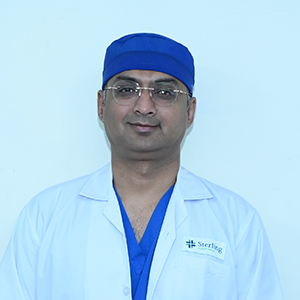Orthopedics and Trauma
The Department of Orthopaedics and Trauma at Sterling Hospitals Rajkot , is dedicated to providing comprehensive and advanced musculoskeletal care to our patients. Our musculoskeletal system is a complex network of bones, muscles, joints, tendons, ligaments, bursae, and other structures that work together to give form, stability, and movement to the human body. With a team of highly skilled and experienced physicians and specialists, we offer a wide range of services to meet the diverse needs of our patients. Our department is staffed by surgical, research, and clinical consultants who work collaboratively in an integrated setting, bringing together their expertise to deliver the highest quality of care.
Our services include consultations with Orthopaedic surgeons and rheumatologists, who provide expert diagnosis and treatment for a variety of musculoskeletal conditions. We also offer specialized care in hand surgery, sports medicine, Orthopaedic oncology (with a focus on limb-salvage surgery for bone and soft-tissue tumours), neurology, physical therapy, endocrinology, radiology, pain management, specialized nursing care, and nutritional support.
In addition, we have dedicated centers for advanced Orthopaedic surgery, joint replacement surgery, arthroscopic surgery, paediatric Orthopaedics, sports medicine, sports injury treatment, and comprehensive arthritis management. Our team utilizes the latest techniques and technologies in these specialized areas to provide the most effective and efficient care possible.
To support our patients' needs, our department is equipped with advanced facilities, including intensive care services, a modern Accident and Emergency Department, and a state-of-the-art Physiotherapy and Rehabilitation Department. We have established trauma protocols to ensure prompt and efficient treatment for critically injured patients, including accident victims.
At Sterling Hospitals Rajkot , we are committed to providing highly individualized care to our patients. Our team takes a patient-centered approach, tailoring treatment plans to meet the unique needs and goals of each individual. We strive to maintain our tradition of excellence in musculoskeletal care, offering compassionate, comprehensive, and advanced care to help our patients achieve optimal outcomes and improve their quality of life.
Services offered by the Department of Orthopaedics and Trauma at Sterling Hospitals Rajkot , may include:
-
Orthopaedic surgeries: The department offers a wide range of Orthopaedic surgeries, including joint replacement surgeries (such as knee replacement, hip replacement, and shoulder replacement), arthroscopic surgeries (to diagnose and treat joint problems), spine surgeries (such as spinal fusion and disc replacement), trauma surgeries (for fractures and dislocations), hand and wrist surgeries, foot and ankle surgeries, and paediatric Orthopaedic surgeries.
-
Trauma care: The department provides specialized care for trauma patients who have suffered injuries due to accidents, falls, sports-related incidents, or other traumatic events. This may include immediate medical attention, stabilization, fracture management, wound care, and rehabilitation services.
-
Diagnosis and treatment of musculoskeletal conditions: The department offers diagnostic services such as X-rays, CT scans, MRI scans, and bone density testing to evaluate musculoskeletal conditions. Treatment options may include medication management, physical therapy, occupational therapy, bracing, casting, and other non-surgical interventions.
-
Rehabilitation: The department may provide rehabilitation services to patients who have undergone Orthopaedic surgeries or have experienced trauma-related injuries. This may include physical therapy, occupational therapy, and other rehabilitation modalities to help patients regain mobility, strength, and function.
-
Sports medicine: The department may offer specialized care for sports-related injuries, including diagnosis, treatment, and rehabilitation for athletes with sports injuries such as fractures, ligament tears, muscle strains, and joint instability.
FAQ’s
- What is orthopedic surgery?
Orthopedic surgery is a specialized surgical field that focuses on the treatment of musculoskeletal conditions, including bones, joints, muscles, tendons, ligaments, and nerves. It involves both surgical and non-surgical techniques to diagnose, treat, and manage various orthopedic conditions and injuries.
- What are the common conditions that may require orthopedic surgery?
Common conditions that may require orthopedic surgery include fractures, joint dislocations, osteoarthritis, rheumatoid arthritis, ligament tears (such as ACL tears), tendon injuries, carpal tunnel syndrome, herniated discs, scoliosis, and sports-related injuries, among others.
- What are the types of orthopedic surgeries?
Orthopedic surgeries can be broadly categorized into joint surgeries (such as joint replacements and arthroscopy), spine surgeries (such as spinal fusion and discectomy), trauma surgeries (to repair fractures and dislocations), sports medicine surgeries (to repair sports-related injuries), hand surgeries, foot and ankle surgeries, and pediatric orthopedic surgeries, among others.
- How do I prepare for orthopedic surgery?
Preparing for orthopedic surgery may involve various steps, including a thorough evaluation and assessment by your orthopedic surgeon, pre-surgical tests (such as blood work and imaging studies), reviewing and adjusting any medications you are taking, discussing any allergies or medical conditions with your surgeon, arranging for transportation and support after surgery, and following any specific pre-operative instructions provided by your surgical team.
- What is the recovery process like after orthopedic surgery?
The recovery process after orthopedic surgery can vary depending on the type of surgery and individual patient factors. It may involve pain management, physical therapy, rehabilitation exercises, lifestyle modifications, and follow-up appointments with your orthopedic surgeon. It is important to follow the post-operative care instructions provided by your surgical team and to actively participate in your recovery process to achieve the best outcomes.
- What are the risks and complications associated with orthopedic surgery?
As with any surgery, orthopedic surgery carries certain risks and complications, which may include infection, bleeding, nerve or blood vessel damage, blood clots, adverse reactions to anesthesia, poor wound healing, scarring, and failure of surgical implants. Your orthopedic surgeon will discuss the potential risks and benefits of surgery with you prior to the procedure.
- How long does it take to fully recover from orthopedic surgery?
The recovery timeline after orthopedic surgery can vary depending on the type of surgery, the patient's overall health, and other individual factors. Some patients may experience a faster recovery, while others may take longer to fully recover. It is important to follow your surgeon's post-operative care instructions and to be patient with the recovery process, as it may take several weeks to months to achieve full recovery and return to normal activities.
- What are the alternatives to orthopedic surgery?
In some cases, non-surgical treatments may be considered as alternatives to orthopedic surgery. These may include medication management, physical therapy, rehabilitation exercises, lifestyle modifications, orthotic devices (such as braces or splints), injections (such as corticosteroids or hyaluronic acid), and other conservative measures. Your orthopedic surgeon will evaluate your condition and determine the most appropriate treatment plan for you.
- What should I expect during my initial consultation with an orthopedic surgeon?
During your initial consultation with an orthopedic surgeon, you can expect a comprehensive evaluation of your musculoskeletal condition, which may involve a medical history review, physical examination, and imaging studies (such as X-rays or MRI). Your surgeon will discuss your symptoms, medical history, and treatment options with you,











